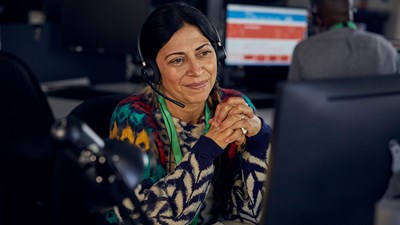Let’s be real, Glasgow student life can feel like a blur of deadlines, caffeine, and wondering what on earth you’ll do with your degree (other than tell your nan it’s “going really well, thanks”).
But between the essays and the all-nighters, there’s a chance to do something genuinely life-changing (and yes, it’ll look amazing on your CV too). This year, as Childline celebrates its 40th anniversary, why not give those it serves the best birthday gift ever: Your time?
What is Childline all about?
To put it simply, Childline is a safe space where children can be themselves. Any child up to the age of 19 can give the number a call for support with any issue they’re dealing with at that moment. It’s a safe, non-judgmental space for young people to just be honest—something that’s getting harder in a world where red pill podcasts exist and shows normalising teen suicide mess with how teens see mental health, and the algorithm seems personally invested in everyone’s downfall. The service runs on compassion, empathy, and the commitment of volunteers who make sure no young person ever feels they have nowhere to turn. And right now, there’s an opportunity for students to join that mission.
If you’re studying in Glasgow you could be part of this extraordinary network. Students bring something special to Childline: Energy, empathy, and the ability to relate to young people in a way that older volunteers sometimes can’t.
You’ve lived through the chaos of adolescence more recently than most, and sometimes what a teen really needs is someone who actually understands what it’s like to grow up in this weird era of social media and modern technology. You don’t have to be a “kid person” to start—just someone who respects children and believes they deserve to be heard. You might even surprise yourself and find that you love the work.
The best part? Childline works around your schedule. Shifts are in the evenings or at weekends, and you only need to do four hours every two weeks. There’s even an online scheduling system so you can pick shifts that work best for you, with shorter two-hour shifts available if you’re drowning in coursework.

A typical shift lasts four hours and starts with a short team briefing. You’ll be allocated to either calls or the online chat service, where you might speak with several children over the course of your shift—some conversations short and light, others much longer and more personal. No two shifts are ever the same.
At the end, the team comes together again for a debrief, to reflect and make sure no one carries the emotional weight of the calls home alone. The team is friendly, the kettle’s always on, and there’s even a book club and the occasional night out for volunteers—recently a curry and a ceilidh. Travel expenses are reimbursed, so no one’s out of pocket for helping out.
And the benefits don’t stop when your shift ends. Volunteers often say the skills spill over into everyday life—they’re more patient with family, more understanding with friends, and better at offering real emotional support. It can even help develop future parenting skills (though let’s not think about that too hard during exam season).
How do I get involved?
 You can start by signing up for a 30-minute online information session to see what the role involves. After that, there’s an application asking about your motivations, your resilience, and your emotional awareness. If you’re successful, you’ll be invited to a friendly online interview, and then after a few safeguarding checks and all the usual admin, you’ll join a 12-week online training programme.
You can start by signing up for a 30-minute online information session to see what the role involves. After that, there’s an application asking about your motivations, your resilience, and your emotional awareness. If you’re successful, you’ll be invited to a friendly online interview, and then after a few safeguarding checks and all the usual admin, you’ll join a 12-week online training programme.
Don’t panic – it’s beginner-friendly and incredibly supportive. You’ll learn everything from Childline’s counselling model to how to handle sensitive topics like self-harm or online safety. You’ll even shadow real volunteers and take your first calls with a mentor by your side.
Childline doesn’t expect you to be a therapist or to “fix” people. The goal is to listen and to let a young person feel seen and understood. You might be the first person they’ve ever opened up to. That’s powerful.
Around forty per cent of the children who contact Childline talk about mental and emotional health—issues like loneliness, grief, or relationship struggles. Some reach out about darker things, and that’s where you come in. You don’t need to have all the answers—just a willingness to listen, and the courage to care.
The role is especially appealing to students in psychology, sociology, or medicine (but anyone can get involved). For you lot, this will look gold on your CV as well as building soft skills. You’ll learn what empathy actually looks like in action—listening without rushing to fix, speaking carefully, staying calm when someone is in distress.
For future doctors, this kind of experience is priceless: It builds the bedside manner that no textbook can teach. For those studying human behaviour, it offers a real-world understanding of how emotions, relationships, and resilience play out in young lives…and for psychology students, it’s a chance to finally use all those empathy theories on someone who isn’t your flatmate having an existential crisis. If empathy were a module, this would be the A+ assignment.
And if you’re thinking long-term, volunteering here opens doors. Loads of people go on to careers with the NSPCC, in counselling, healthcare, or social work. It’s the kind of experience that shows future employers you’re not just qualified—you’re compassionate and emotionally intelligent.
Four hours every two weeks isn’t much—but for a child who feels invisible, your voice could be the one that makes all the difference. Because when you think about it, changing someone’s life doesn’t always take a superhero cape—sometimes it’s just a headset, a cup of tea, and a heart that’s ready to listen.
